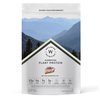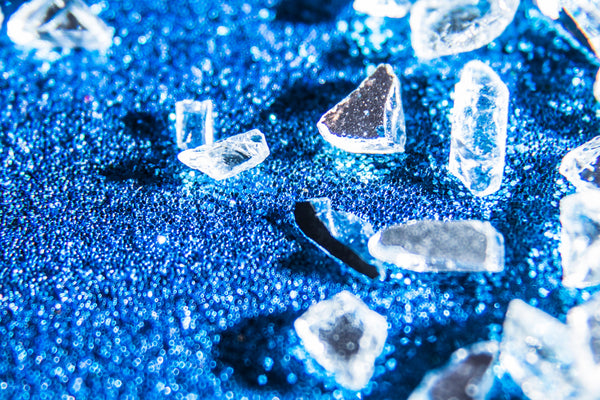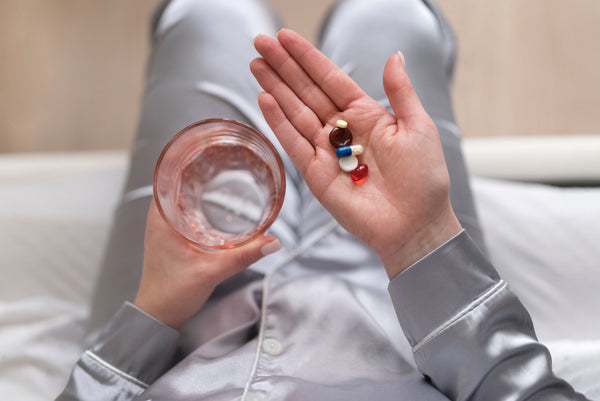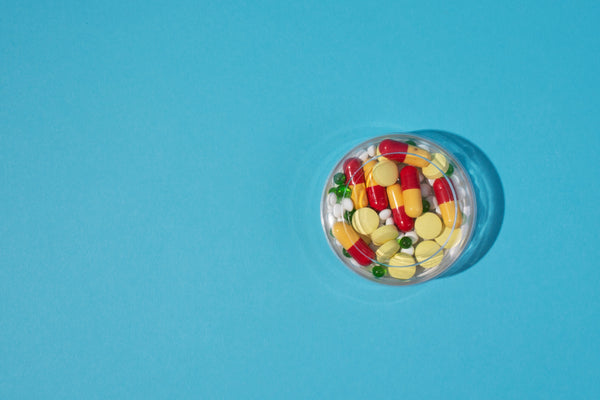If you're a fitness enthusiast or new to the world of wellness, you've probably seen the words chia seeds at the top of the ingredient list when looking for protein recipes. This ingredient has gained popularity worldwide due to its high nutrient profile and its role in improving overall health. But what’s so great about this product, and is chia seed protein really worth all the hype? Scroll down to get all the information you need on chia seeds and learn how they are a great source of protein.
What are Chia seeds?
Chia seeds are small, oval-shaped edible seeds of a flowering plant called Salvia hispanica. It is regarded as a superfood due to its numerous health benefits. Native to Mexico and Guatemala, these seeds come in white, grey, or black colors and can be eaten raw or added to your meal as an additional ingredient. Chia seeds have recently gained popularity in the fitness industry, but they have been a staple food for the Aztecs and Mayans since 3500 B.C. They have also been used for thousands of years for religious, culinary, and medical purposes. The word ‘chia’ means strength. These tiny seeds contain good-quality protein, fiber, healthy fats, and other nutrients. They actually have an excellent plant-based, high-quality protein profile that can meet the protein needs of many vegans. For a long time, plant proteins have been looked down upon as they lacked a few important components like amino acids, making them second-class proteins. However, a few plant-based proteins have recently been discovered that match the nutritional profile of animal proteins, making them first-class proteins. Read on to learn more.
Chia seeds may look similar to another superfood called basil seeds. Both seeds have numerous similarities, but they differ in their nature and health benefits. A few pointers to help you distinguish chia seeds from basil seeds:
- Chia seeds are available in white, grey, or black, whereas basil seeds are dark black.
- Chia seeds can be sprinkled on top of foods, whereas basil seeds should not be eaten raw.
- Chia seeds swell slowly after absorbing water, whereas basil seeds swell instantly.
- Chia seeds are tasteless, while the other has a mild basil flavor
- Chia seeds are slightly bigger and oval-shaped, while basil seeds are comparatively tiny and round shaped.
Although both are considered superfoods, they have different nutritional profiles. If you're looking for a vegan protein source, chia seeds are a good option.
Nutritional Profile of Chia Seeds
Chia seeds were named after the word "strength" for a reason. They are an excellent source of proteins, fiber, fats, and minerals. 2 tablespoons of chia seeds provide 114 calories, 4 grams of protein, 11 grams of fiber, and 7 grams of unsaturated fat. It also contains trace minerals like magnesium, phosphorus, zinc, and copper. Chia seeds are often referred to as superfoods or functional foods due to their high nutrient content. Superfoods are nutrient-dense foods that can help you maintain a healthy lifestyle while also keeping you energized and feeling good.
1. Chia Seeds as a Mineral Source:
Our body needs minerals for different purposes, and Chia seeds have ample amounts of them.
- Calcium: We are all aware of how important the mineral calcium is for our muscles, bones, and nerve health.
- Phosphorus: This is another essential mineral for bone, teeth, and tissue health. It has multiple roles in our body. Apart from activating enzymes and regulating the body’s pH, it is also essential for gene construction.
- Manganese: A trace element that is needed in small amounts but is not synthesized in the body and needs to be obtained from dietary sources. It helps in the breakdown of carbohydrates, proteins, and fats and also helps in wound healing, bone building, and strengthening immunity.
- Selenium: This trace mineral is an essential component of various enzymes that make up DNA. The thyroid gland has the highest concentration of selenium, as it plays a key role in the metabolism of thyroid hormones.
- Magnesium: More than 50 percent of this mineral is stored in our bones. It aids many enzymes in carrying out various bodily functions ranging from blood sugar regulation to nerve function.
- Copper: A naturally occurring metal found in rocks, soil, and water. It assists in brain development and supports immune function.
- Iron: Iron is required for the formation of red blood cells, which transport oxygen throughout the body. Everyone, from children to menstruating women, pregnant or lactating women, and the elderly, needs to get their daily dose of iron.
2. Chia Seeds as an Antioxidant Source
Not just minerals, but chia seeds provide us with a host of potent antioxidants as well.
- Quercetin: This belongs to a group of plant pigments called flavonoids. They are known to scavenge free radicals, which damage cell membranes, tamper with DNA, and neutralize them. This powerful antioxidant helps prevent cardiovascular and inflammatory diseases.
- Chlorogenic Acid: A major component of coffee, this antioxidant plays an important role in preventing diabetes, cardiovascular disease, and obesity. It is also known to reduce inflammation, lower cholesterol, and even give your skin a youthful boost.
- Caffeic Acid: Just like other antioxidants, caffeic acid helps in the prevention of inflammation, neurodegenerative diseases, and diabetes. It is also known to boost the performance of athletes.
- Kaempferol: Another antioxidant exhibiting antimicrobial, anti-inflammatory, anticancer, cardioprotective, neuroprotective, antidiabetic, antiallergic, and analgesic properties.
3. Chia seeds as a Protein Source
Chia seeds are the best vegan protein source because they contain a high concentration of protein. There are 20 different types of amino acids that can be combined to make a protein. Each protein's unique 3-dimensional structure and function are determined by the sequence of amino acids.
Chia seed protein contains 18 of these 20 amino acids, 9 of which are essential. This makes chia seeds a complete protein source. This category contains very few plant-based protein sources. Also, not all the plant proteins that you consume are easily digested or absorbed. Chia seeds surpass this test as well and stand out as a high-quality protein.
Why are Proteins Important?
Proteins are building blocks of our body that help us maintain and regulate several bodily functions. From growth and development in childhood to building muscles and immunity to maintaining healthy body weight and blood sugar levels, its benefits are countless. All age groups require protein; however, pregnant and breastfeeding women, as well as athletes, require more of it.
Proteins form an important part of the food group. They are made up of small molecules attached to each other called amino acids. There are around 20 amino acids, out of which 11 are made inside the body while we need to supplement the remaining nine through the foods we eat. These 9 amino acids are called essential amino acids: histidine, valine, leucine, isoleucine, lysine, methionine, phenylalanine, threonine, tryptophan, and valine. Unlike non-vegetarian foods, many vegetarian protein sources are deficient in one or more of these essential amino acids, making them an incomplete source of protein.
Signs that Indicate your Protein Intake might be Low:
- Unexplained weight loss
- Generalized fatigue
- Hair thinning
- Brittle nails
- Poor concentration
- Insomnia
- Prone to injuries
Other Health Benefits of Chia Seeds
Have you ever heard the saying “good things come in small packages”? Well, chia seeds prove it’s right. These tiny seeds come with mighty benefits. It is high in nutrients, and in addition to being an excellent protein source, it also has numerous health benefits.
1. Improves Digestive Function:
The high fiber content of chia seeds makes them a natural laxative. Chia seeds have the ability to soak up water and swell to form a gel-like substance. This property helps in providing moisture and bulk to the stools, facilitating their smooth passage into the intestines. Hence, people with constipation may incorporate them into their diet for better bowel clearance.
2. Aids Weight Management:
Chia seeds' high protein and fiber content also help in weight management. The fiber component keeps you full for a longer time, preventing you from overeating your next meal, while a high-protein diet has been helpful in promoting weight loss. So when eaten in moderation, chia seeds can be helpful with weight loss.
3. Helps with Diabetes Management:
The high fiber component of chia seeds may help balance blood glucose spikes after a meal. Chia seeds have been found to transform glucose into a slow-releasing carbohydrate. This prevents sudden glucose splurges in the blood, allowing blood sugar levels to be managed.
4. Improves Heart Health:
Chia seeds contain an antioxidant called quercetin. This flavonoid is responsible for reducing health risks, particularly cardiovascular diseases. The high fiber content also helps to lower LDL (bad cholesterol) and raise HDL (good cholesterol). The omega-3 fatty acids (alpha-linolenic acid) in chia seeds may further help in preventing cardiovascular diseases.
5. Supports Bone Health:
Chia seeds contain many nutrients vital for bone health, like calcium, magnesium, and phosphorus. Apart from bone, these nutrients also assist in muscle and nerve functioning. You may be surprised to know that chia seeds have more calcium than traditional dairy products.
6. Reduces Inflammation:
Chia seeds are excellent sources of antioxidants such as Caffeic acid, Chlorogenic acid, Quercetin, and Kaempferol. These antioxidants aid in the battle against free radicals. Free radicals cause oxidative stress in cells, which leads to health problems. These antioxidants thus help reduce inflammation and health risks caused by free radical damage.
How to get Enough Protein Every Day?
- Try having a high-protein breakfast
- Try including proteins in every major meal
- 3-4 servings of dairy products per day (skip if lactose intolerant).
- Consume 2-3 servings of dals and pulses per day.
- Have protein supplements
- Include chia seeds into your daily diet
How do you Include Chia Seeds in your Diet?
The best part about chia seeds is that they can be added to a variety of recipes. They have the ability to soak up the liquid in which they are immersed and swell up. It can be a part of your breakfast or mid meals, lunch, or dinner. Chia seeds can be added to your regular diet in several ways. Let’s look at a few of them.
Chia seeds can be eaten raw or added to smoothies, baked goods, and yogurts. You can enjoy its benefits whether you eat it raw, soaked, or in ground form.
Porridge: Want to make a healthy start to the day or have a filling but healthy meal for dinner? Adding chia seeds to your porridge will not only enhance its texture but also its nutrient value. You may add them raw for the nutty, crunchy texture or even soak them overnight.
Yogurt: Add a dash of these seeds as a topping or soak them along with your favorite fruits. Refrigerate it and enjoy your crackling fruit yogurt.
Pudding: Enjoy your pudding with a healthy twist with these wonder seeds. If you prefer your pudding to be smooth rather than crunchy, add ground chia seeds. This gives it a smooth, creamy texture.
Bakes: Chia seeds can be used as an egg replacer in baking cakes or bread. Chia seeds act as a binding agent just like eggs. You may also add them to your muffin batter or simply sprinkle some over your homemade bread.
Beverages: You may blend them in your smoothies, fruit juices, or lemonades to improve their texture and enhance their nutritional value.
We gave you a few common ways, but you may use your inner creative chef to incorporate these power-packed mini seeds in a way that suits your needs best.
Chia Seeds in Supplements
If you are too caught up with work and have no time to balance your meals with sufficient proteins, you can always opt for a shorter, quicker route by incorporating protein powders/supplements to meet your health goals.
Due to their multiple benefits, chia seeds are being used as nutritional supplements. Chia seeds are available as a single-ingredient supplement or in combination with other superfoods like protein bars and powders. These wonder seeds are also available on the market as an integral component of vegan protein powders and organic protein powders. Since it does not have a distinct taste of its own, it can easily blend into various flavored protein powders. You can use such organic protein powders as a substitute if you don't like the crunchy, nutty texture of the raw, protein-rich seeds or don't have the time to grind them yourself.
Wrapping Up!
If you are a vegan/vegetarian or plan to become one, chia seeds can help you meet your protein requirements. After going through their entire nutritional profile, there’s no doubt that they are the best vegan protein source for high-quality protein, and since the seeds are tasteless, you can add them to a variety of recipes. It may not always be practical to consciously balance all of your meals with adequate protein, or you may have limited options for including high amounts of protein in your daily diet. In such cases, you may opt for flavored protein powder containing chia seeds as an ingredient. While searching for the best plant-based protein supplements, look for those that are Informed Sports Certified. This guarantees that the product doesn’t contain any banned substances like steroids. Also, remember to consult your physician before starting any new or high-protein supplement, especially if you have a sensitive gut.
References
Chia Seeds | The Nutrition Source | Harvard T.H. Chan School of Public Health
Complete vs. Incomplete Proteins: What's the Difference? (webmd.com)
13 of the Best Vegetarian and Vegan Protein Sources – Cleveland Clinic
Chia Seed - an overview | ScienceDirect Topics
310BC7365996 (academicjournals.org)
Chia Seeds: Health Benefits, Nutrients per Serving, Uses, Safety Information, and More (webmd.com)
Amino acid composition of proteins from chia seeds. | Download Scientific Diagram (researchgate.net)


























